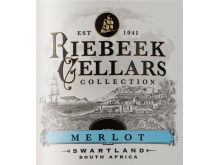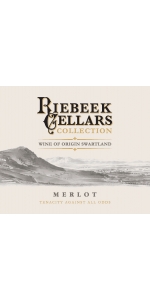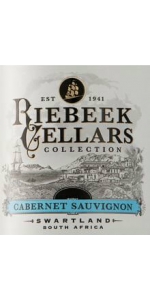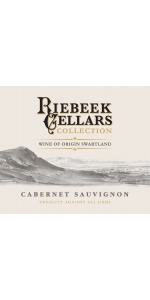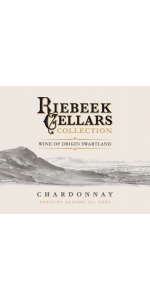Riebeek Merlot 2015
| Country: | South Africa |
| Region: | Riebeek Kasteel |
| Winery: | Riebeek Cellars |
| Grape Type: | Merlot |
| Vintage: | 2015 |
| Bottle Size: | 750 ml |
Riebeek Cellars Merlot is made from 100% Merlot.
Grapes were cold soaked overnight. Inoculated with selective yeast. Fermentation took place at 24 - 26 degree Celsius. Wine were pressed at
above 2 degree Balling. Malolactic fermentation finished in stainless steel tanks. Oak maturation include French oak chips, French oak staves and 2nd and 3rd fill barrels. All blended together to perfection.
The style is elegant with distinctive red berries and well-integrated wood flavors on the nose. The pallet is velvety and smooth with an aftertaste that lingers with the juicy flavors of abundant berries.
At room temperature or slightly chilled. Enjoy with pasta or light meat dishes.
Riebeek Cabernet Sauvignon is made from 85% Cabernet Sauvignon,15 % Shiraz.
An exciting new world style wine with upfront blackcurrant flavors. The black fruit is well-balanced with subtle French oak for a complex nose and an elegant and lingering follow-through. An exceptional example of a lighter style Cabernet Sauvignon that can be enjoyed young. Excellent with red meat dishes or veal.
Riebeek Cabernet Sauvignon is made from 100% Cabernet Sauvignon.
An exciting new world style wine with upfront blackcurrant flavors. The black fruit is well-balanced with subtle French oak for a complex nose and an elegant and lingering follow-through. An exceptional example of a lighter style Cabernet Sauvignon that can be enjoyed young. Excellent with red meat dishes or veal.
Cold soaked overnight. Inoculated with selected yeast. Fermentation temperature was between 24 -26 degrees Celsius. Regular pump-overs were given to enhance colour and flavour extraction. Different batches of wine matured with French oak staves and 2nd and 3rd fill barrels were all blended together to perfection.
Served at room temperature, this Cabernet Sauvignon pairs perfectly with red meat dishes, especially classic recipes like roasted leg of lam, grilled lamb chops and beef kebabs.
Riebeek Cabernet Sauvignon is made from 100% Cabernet Sauvignon.
An exciting new world style wine with upfront blackcurrant flavors. The black fruit is well-balanced with subtle French oak for a complex nose and an elegant and lingering follow-through. An exceptional example of a lighter style Cabernet Sauvignon that can be enjoyed young. Excellent with red meat dishes or veal.
Cold soaked overnight. Inoculated with selected yeast. Fermentation temperature was between 24 -26 degrees Celsius. Regular pump-overs were given to enhance colour and flavour extraction. Different batches of wine matured with French oak staves and 2nd and 3rd fill barrels were all blended together to perfection.
Served at room temperature, this Cabernet Sauvignon pairs perfectly with red meat dishes, especially classic recipes like roasted leg of lam, grilled lamb chops and beef kebabs.
Riebeek Chardonnay is made from 100 percent Chardonnay.
This unoaked Riebeek Chardonnay displays a brilliant green-gold color. The style is dry but fruity. The nose offers exceptional tropical aromas that follow through in the palate with a well-rounded finish of lingering citrus fruits. It is lovely with most entrees from crisp salads to creamy soups and chicken, whether served grilled or in a creamy sauce.
Free run juice was used. After settling and acid adjustment, juice was inoculated with selected yeast. Fermentation temperature remained between 13-14 degrees Celsius. Wine was left on lees for a few months prior to bottling to enhance the flavour.
It is lovely with most entrees, from crisp salads to creamy soups and chicken, whether served grilled or in a creamy sauce.
Riebeek Chardonnay is made from 100 percent Chardonnay.
This unoaked Riebeek Chardonnay displays a brilliant green-gold color. The style is dry but fruity. The nose offers exceptional tropical aromas that follow through in the palate with a well-rounded finish of lingering citrus fruits. It is lovely with most entrees from crisp salads to creamy soups and chicken, whether served grilled or in a creamy sauce.
Free run juice was used. After settling and acid adjustment, juice was inoculated with selected yeast. Fermentation temperature remained between 13-14 degrees Celsius. Wine was left on lees for a few months prior to bottling to enhance the flavour.
It is lovely with most entrees, from crisp salads to creamy soups and chicken, whether served grilled or in a creamy sauce.
Riebeek Cellars Merlot is made from 100% Merlot.
Grapes were cold soaked overnight. Inoculated with selective yeast. Fermentation took place at 24 - 26 degree Celsius. Wine were pressed at
above 2 degree Balling. Malolactic fermentation finished in stainless steel tanks. Oak maturation include French oak chips, French oak staves and 2nd and 3rd fill barrels. All blended together to perfection.
The style is elegant with distinctive red berries and well-integrated wood flavors on the nose. The pallet is velvety and smooth with an aftertaste that lingers with the juicy flavors of abundant berries.
At room temperature or slightly chilled. Enjoy with pasta or light meat dishes.
The Riebeek Cellars Estate
Riebeek Cellars was established in 1941 and is situated in Riebeek Kasteel at the foot of Bothma's Kloof Pass. This medium-sized winery on the western coast of the Cape Province of South Africa sources its grapes from the fertile Riebeek Valley and the slopes of the mountain where the climate is very similar to the Mediterranean. Through the years as vineyard practices developed, cultivars were planted in soil and at slopes best suited to them. These well-tended vineyards enable the production of high quality wines which makes Riebeek Cellars the choice of wine buyers internationally. Well-known both in South Africa and abroad, Riebeek Cellars manages a variety of brands for various countries.
Heritage
Corporal Pieter Cruythoff, a scout of Jan van Riebeeck, founded the Riebeek Valley in 1661. Impressed by the single standing mountain, he called it Kasteelberg (“Castle Mountain”) commemorating the Castle of Good Hope in Cape Town, the fortress of Commander Jan van Riebeeck. The twin towns, Riebeek Kasteel and Riebeek West, established at the foot of Kasteelberg, are therefore also suitably named after Van Riebeeck.
The Riebeek Valley is a mecca of wonderful wines, exceptional food and exquisite art where tourists and locals alike are forever tempted into spending more time than allowed. The serene valley falls in the bigger Swartland region which is called the 'bread basket' of South Africa for its grain production, while it is further internationally acclaimed for its high quality olive products. With various hotels and fine-dining restaurants as well as true country hospitality, the Riebeek Valley has become a very popular tourist destination. The ultimate charm of Riebeek is however in its people and their commitment and passion for wine.
"Located in the Western Cape region of South Africa, this winery was established in 1941, which makes it relatively old compared to all the new wineries that have sprung up in this area. Among the first Pinotages I can recommend, it’s also a good value. Pinotage, which is, of course, ubiquitous in South Africa, was first made in 1941, when the Cinsault grape (primarily grown in southern France and the Rhone Valley) was crossed with Pinot Noir." - Robert Parker's Wine Advocate (Issue 201, June 2012).
- back
Domaine Zind-Humbrecht Riesling Heimbourg is made from 100 percent Riesling.
Bright yellow color. The nose expresses an immediate sense of strong mineral and limestone influence. After aeration or decanting, it will show eventually bright citrus, bergamot, spices and an expected slight austerity. It is very expressive today, but it is easy to see that this wine still has much more to show in the future. The mouth is tight, dry, showing a bright acidity and elegant finish.
Review:
What a fascinating peachy, flinty and smoky nose this great dry Riesling has. Power, energy and vitality on the generous palate, but also a profoundly chalky and flinty minerality. Long juicy finish that pulls you back for more. From biodynamically grown grapes. Drink or hold.
-James Suckling 95 Points
Altesino Brunello di Montalcino Montosoli is made from 100 percent Sangiovese.
One of the most sought after wines from Montalcino, Montosoli is consistently a blockbuster red. Its intense ruby red color tends towards elegant garnet with age. On the nose, it shows a complex personality with a delicious blend of black cherry, raspberry, violet, licorice, vanilla and black pepper. Extremely enticing, opulent and elegant on the palate, with a warm, long-lasting finish, Montosoli is a wine for special occasions.
Pair this wine with beef bourguignon and stroganoff, lamb shank, and roasted rabbit.
Review:
A juicy and lightly austere young red with blackberry, cherry and bark character on both the nose and palate. It’s medium- to full-bodied with chewy tannins that soften at the end, but still make your mouth pucker. Give this two or three years to soften. Best after 2027.
-James Suckling 97 Points

